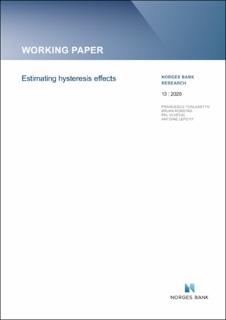Estimating hysteresis effects
Working paper
Published version
Permanent lenke
https://hdl.handle.net/11250/2690092Utgivelsesdato
2020Metadata
Vis full innførselSamlinger
Sammendrag
In this paper we extend the standard Blanchard-Quah decomposition to enable fluctuations in aggregate demand to have a long-run impact on the productive capacity of the economy through hysteresis effects. These demand shocks are found to be quantitatively important in the US, in particular if the Great Recession is included in the sample. Demand-driven recessions lead to a permanent decline in employment while output per worker is largely unaffected. The negative impact of a permanent decline in investment (including R&D investment) on productivity is compensated by the fact that the least productive workers are disproportionately hit by the shock and exit the labor force.

